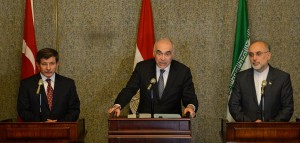
AFP PHOTO / KHALED DESOUKI
On Monday night, foreign ministers from Egypt, Iran, and Turkey met at the Foreign Ministry in Cairo to discuss what a spokesperson called, “the deteriorating situation in Syria and put[ing] an end to the suffering of the Syrian people.”
This meeting is the latest development in an initiative called for by President Mohamed Morsy, who envisioned the three countries along with Saudi Arabia working to end the crisis in Syria, which began last year as a popular uprising and has devolved into a civil war.
The tripartite meeting is an odd grouping because the three regional powers have often been at odds over the Syrian crisis. Turkey hosts the opposition Syrian National Council, while Iran has repeatedly shown solidarity with Bashar Al-Assad’s regime.
Still, the three spent hours on Monday talking about the political and humanitarian situation in Syria.
The Anadolu news agency quoted Turkish foreign minister Davutoglu saying Cairo was an important location to have such a conversation because, “there was a change here following people’s demands, and also an administration came to power with people’s votes. I do hope that there would be an administration in Syria chosen by Syrians.”
However, the tone was not entirely matched by Iranian Foreign Minister Ali Akbar Salehi, who told the Fars news agency that what was needed in Syria was “patience and awareness to restore calm.”
“I am quite surprised to see Iran active in this group,” said Filippo Dionigi, a member of the British Society for Middle Eastern Studies. “The Iranian proposal of a multinational Middle Eastern monitoring group is a measure that does not seem to address satisfactorily the gravity of the situation.”
While Iran urged patience, Saudi Arabia’s Ambassador to the United Nations in Geneva, Abdulwahab Attar, told Saudi state news agency SPA that, “the situation in sisterly Syria reached a tragic level which requires everyone to cooperate and support the Syrian people and to move quickly and seriously to give confidence in the ability of the international community to end the Syrian crisis which worsens day by day.”
Despite this urging for cooperation, Saudi Arabia did not send its foreign minister to Cairo. “One can guess that Iranian participation may not be welcomed by the Saudi crown, which has far more drastic views with regard to the Syrian crisis and al-Assad’s regime than the Iranians,” Dionigi said.
This political back and forth came as the United Nation’s Office for the Coordination of Humanitarian Affairs issued another plea on behalf of the Syria people, reporting that it now “estimates that 2.5 million require urgent humanitarian aid, including 1.2 million internally displaced people hosted in schools and public buildings.”




